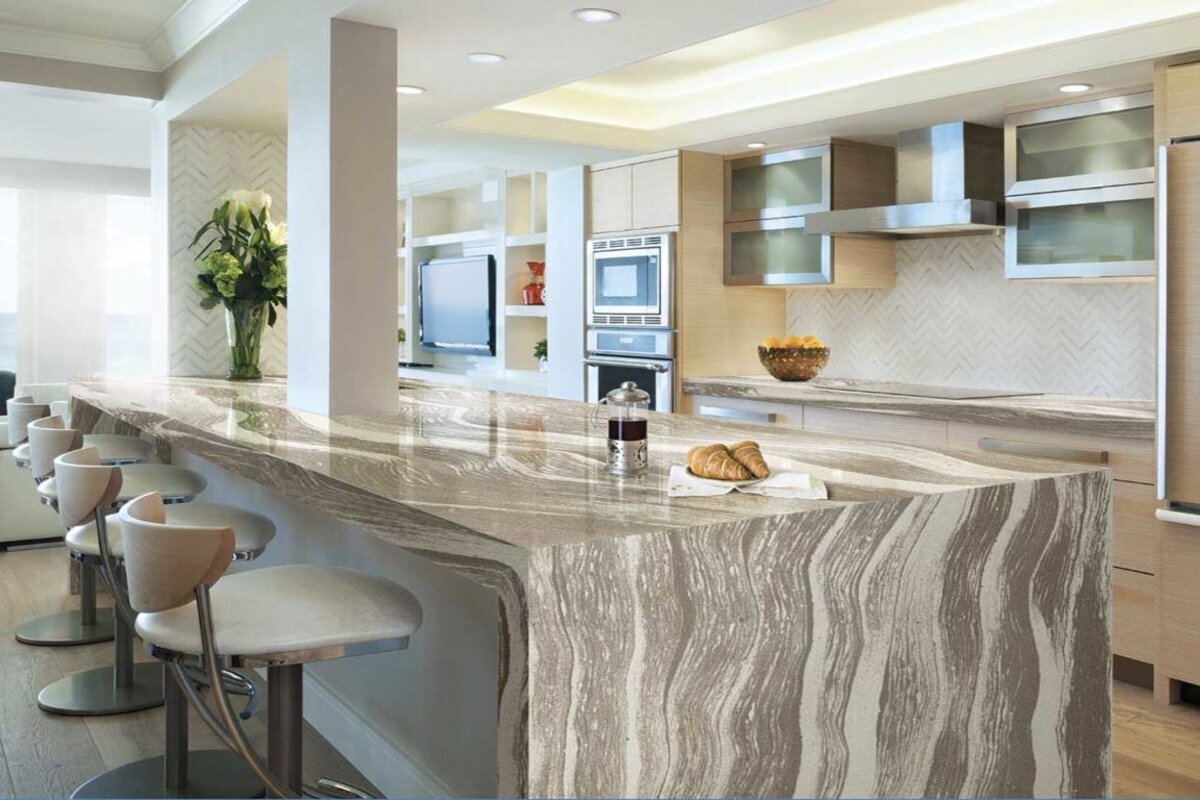Marble countertops have long been a symbol of elegance and sophistication in home design. These natural stone surfaces are increasingly popular for their unique veining and timeless beauty.
However, like any material, marble comes with its own set of advantages and disadvantages. We’re going to dig into those benefits and drawbacks so that we can give you an in-depth look at the pros and cons of marble countertops to help you make the most informed decision possible for your home.
Pros of Marble Countertops
Unparalleled Beauty
One of the most significant advantages of marble countertops is their unparalleled beauty. Each marble slab is unique, offering a range of colors and vein patterns that can’t be found in other materials. This uniqueness means you’ll have a one-of-a-kind surface that serves as a stunning focal point in your kitchen or bathroom.
Heat Resistance
Marble is an excellent choice for kitchens due to its heat-resistant nature. Unlike other countertop materials, marble won’t blister or melt upon contact with hot items. Though using a trivet is always recommended to prevent potential discoloration, the material itself is quite resilient to heat.
Functionality for Bakers
Marble’s surface remains cool and doesn’t absorb heat quickly, which makes it ideal for tasks like rolling out dough or prepping pastries. The smooth, non-stick surface can significantly enhance your cooking and baking experience.
Durability and Longevity
If well-maintained, marble can offer durability and longevity, lasting for decades. This makes it a long-term investment for those who are contemplating a significant upgrade to their home’s kitchen or bathroom.
Cons of Marble Countertops
Susceptibility to Staining
Marble is a porous material, making it more susceptible to stains from liquids like wine, coffee, and oils. While sealing the surface can help mitigate this issue, it’s something to be aware of when considering marble countertops for your home.
Regular Maintenance Required
To keep marble looking its best, regular maintenance is required. This includes periodic resealing to maintain its non-porous qualities and careful cleaning to avoid harsh chemicals that can eat into the marble.
Vulnerability to Scratching
Though durable, marble is softer than other natural stone options like granite, making it susceptible to scratches from sharp objects. Care must be taken in terms of cutting and food preparation to ensure the surface remains unblemished.
Marble vs. Other Common Countertop Materials
When contemplating countertops for a bathroom or kitchen remodel, marble isn’t the only option on the table. Other popular countertop materials include granite, quartz, and laminate, each with its own sets of pros and cons.
- Granite: Granite is another natural stone that offers a range of colors and patterns. Unlike marble, it is less porous and more resistant to staining and scratching. However, granite does not offer the same unique, luxurious veining that marble does, and it also requires periodic sealing.
- Quartz: Quartz countertops are engineered from natural stone and resins, making them less porous and more durable than marble. They also come in a variety of colors and patterns. On the downside, quartz lacks the natural, unique beauty of marble and is not as heat-resistant.
- Laminate: If budget is a concern, laminate countertops offer a cost-effective alternative. They come in a variety of designs, including ones that mimic natural stone. However, they are neither as durable nor as heat-resistant as marble, and they don’t offer the same resale value.
Partner With Karin Ross For Leading Countertop Installation
Marble countertops certainly offer a unique blend of aesthetics and functionality, but they come with their own set of challenges. When it comes to selecting and installing the perfect countertops for your home, Karin Ross Designs is the name you can trust. Reach out today for more information, and get started bringing your dream kitchen to life.










